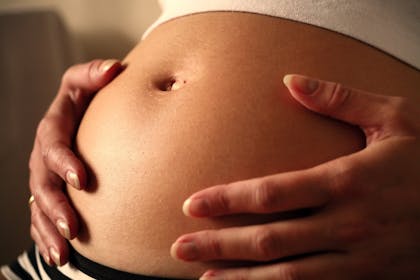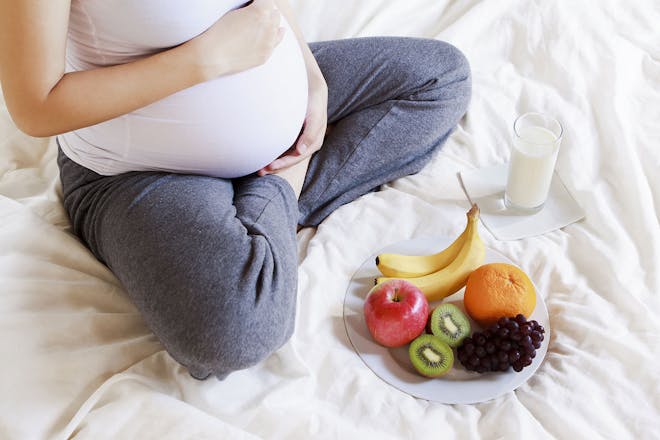Second pregnancy: your baby’s movements

Are you pregnant for the second time and wondering when you'll be able to feel those special flutters and kicks? Discover whether things will feel different this time around, and how early you'll be able to feel your baby move in your second pregnancy.
This page contains affiliate links, which means we may earn a small amount of money if a reader clicks through and makes a purchase. All our articles and reviews are written independently by the Netmums editorial team.
Having your second baby is likely to feel much less daunting than your first. You've been through it all before and chances are you have a much better idea of what to expect – which is great news!
However, that doesn't mean that everything will be exactly the same, and you might be wondering whether things will feel different second time around.
One thing (among many) that you're likely looking forward to is feeling your baby move for the first time. It's an exciting and special moment, and you're probably dying to know when exactly you'll feel those all-important movements, and if it'll be different for your second pregnancy.
FREE NEWBORN NAPPIES
Of course, every mum has a different experience, but read on to find out what you can expect for your baby's movements in your second pregnancy.
What’s the earliest I can feel my baby move in my second pregnancy?
The earliest you're likely to feel your baby move in your second pregnancy is at about 16 weeks.
However, that's the earliest date and it's by no means a set schedule. The first time you feel your baby move could be up to eight weeks later than that, at 24 weeks.
According to the NHS, you should start to feel your baby move between around 16 weeks and 24 weeks, so it might be that you feel your baby move earlier or later than other mums do. That's totally fine, as each pregnancy will be different, so try not to compare yourself to others too much!

Still, in your second pregnancy you might find that you feel your baby move earlier than you did in your first.
The NHS says that during your first pregnancy you might not feel movements until after 20 weeks – so, if that was the case for you first time around, you might be able to feel some movement earlier in your second pregnancy.
Feeling your baby move for the first time between 16 and 24 weeks is normal. If you haven't felt your baby move by 24 weeks, then you should tell your midwife who will be able to check your baby's heartbeat and movements.
When can other people feel my baby's movements?
Feeling your baby move for the first time is a special moment for yourself, of course – but you'll probably want to share it with others too!
As your pregnancy progresses, other people will be able to feel your baby moving by touching your bump, which is really exciting to share with your partner, family and friends.
Unfortunately, other people won't be able to feel your baby moving quite as early as you. The point when this is possible will be different for everyone, so be patient and eventually it will happen!
What else can I expect from my baby's movements?
By your second pregnancy, you'll already know how it felt when your first baby was moving around inside. Still, every pregnancy can be different, so it's useful to remind yourself of what to expect...
When you first start feeling your baby move, it might feel like a gentle fluttering or a swirling feeling. Then, as your baby gets bigger and you move further through your pregnancy, you might start to feel kicks and jerky movements as your baby starts to move around more. A lot of babies even get hiccups in the womb, which can feel like a rhythmic jerking sensation.
You'll be able to feel your baby move right up until you give birth, so if you notice any changes to your baby's movements it's important to get them checked out.
For this reason, the NHS says it's important for you to get used to your baby's normal day-to-day movements, so you can spot any changes.
It's not advised to count your baby's kicks, as there isn't a set number of kicks you should feel each day. Instead, make sure to get to know your baby's usual pattern of movements – and get any changes to their movements checked by a midwife or a doctor, as this might be a sign that something could be wrong.
When to get medical help
The NHS advises that you call your midwife or maternity unit straight away if you notice any of the following:
- your baby moving less than usual
- you cannot feel your baby moving anymore
- there is a change to your baby's usual pattern of movements
You should make sure to call right away if you notice any of the above, rather than waiting – even if it's at night.
Your baby's movements and heartbeat will be checked by your midwife or doctor, and they'll be able to spot if something is wrong.
Your baby moving around less than usual could be a sign that they're unwell, and it may point to an infection or another problem, according to the NHS – so it's important to get checked out quickly. Getting treatment if there is something wrong could save your baby's life, so it's definitely something to be taken seriously.
Looking for more information on what to expect during pregnancy? Read our articles below or share advice with others in the forum.


